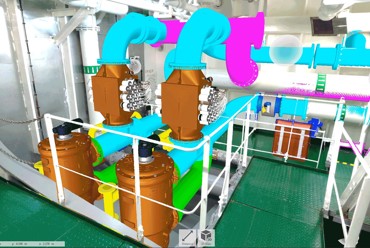
January 2023

Specialises in the development, manufacturing, sale and service of IMO and USCG certified Ballast Water Management & Treatment Systems. The mission is to deliver systems that reliably meet the IMO and USCG discharge standards, with the lowest total cost of ownership. Complying with regulations and protecting marine ecosystems.
The CompactClean ballast water management system (BWMS) from DESMI Ocean Guard helps protect fragile marine ecosystems all over the world. Based on UV light technology, it effectively neutralises or kills algae, bacteria, and small organisms in the ship’s ballast water, preventing them from travelling across the globe and disrupting ecosystems elsewhere as invasive species.
IMO and USCG approved
DESMI CompactClean systems have been IMO approved since September 2018 and US Coast Guard approved since April 2019. This makes them suitable for operation round the world, providing a truly global solution to a global problem.
No hazardous chemicals
Being UV based, the CompactClean system does not produce or need hazardous chemicals to work. Its unique nickel-aluminium-bronze UV reactor is optimised for high flows and is highly resistant to seawater. The system can treat water down to a record-breaking 35% UV-T in IMO mode and 40% in USCG waters.
A ballast water management system (BWMS) is a system designed to neutralize or kill organism before they enter into a ship's ballast tank. This is done to prevent spread of invasive species across the world. A ship typically takes in ballast water when unloading cargo. This ballast water might contain algae, bacteria and small organisms from another part of the world. This problem is fixed by making Ballast Water Management Systems mandatory on larger vessels. The CompactClean system is a BWMS based on UV light technology.
Ballast Water Management has been mandatory for all new build vessels since September 8, 2017 and for and existing vessels it has been mandatory since September 8, 2019 at the time of renewing their IOPP certificate. All vessels over 400 GT needs to have a system installed by September 8, 2024. DESMI Ocean Guard has been developing ballast water management & treatment Systems since 2009.
It has proven that invasive species are spread across the world via ballast water. To avoid this a BWMS has become mandatory equipment for all vessel above 400 GT. The BWMS system, like CompactClean, will neutralize or kill all organisms in the ballast water to avoid disturbing the ecological balance of the world..
There are several technologies available out there. Some are based on active substances like adding chemicals to the water to kill the organism while other systems are based on UV technology. The CompactClean system is based on filtration and UV light. The filter will remove larger organism above 20 microns and the UV light will kill the smaller organism before they enter the ballast tanks.
A ballast water exchange is only necessary to conduct if your system has come out of compliance during normal treatment when loading and unloading goods. If a system goes out of compliance and keep letting water into the ballast tanks, then this water needs to be exchanged prior to entering the next port. This has to be done 200 nautical miles from the shore on deep water. A CompactClean system can treat all the way down to a UV-T of 35%. This means that it can treat the water in virtually all ports around the world.
DESMI Ocean Guard is continuously improving their technology. The CompactClean system is the 3rd generation of systems. This system has been further developed into three variants tailormade for specific user scenarios, namely CompactClean, CompactClean OptIMO and CompactClean Bulker.
The CompactClean system is based on UV light and therefore does not produce or need any hazardous chemicals in order to work. The CompactClean system utilizes a unique UV reactor optimized for high flows. The UV reactor is produced in Nickel Alu Bronze, which is a very seawater resistant material. It has proven its superior qualities in marine pumps for decades. The system can treat water down to a record breaking 35% UV-T in IMO mode and 40% in USCG waters.
The CompactClean system has been approved for IMO regulation since September, 2018 and USCG approved since April, 2019. Furthermore the certificates are all according to newest standards (IMO, revised G8) and has some of the best operational limitation in the industry; no limitations with regards to salinity and temperature, no holding time requirements in IMO waters and only two hours in USCG waters.
